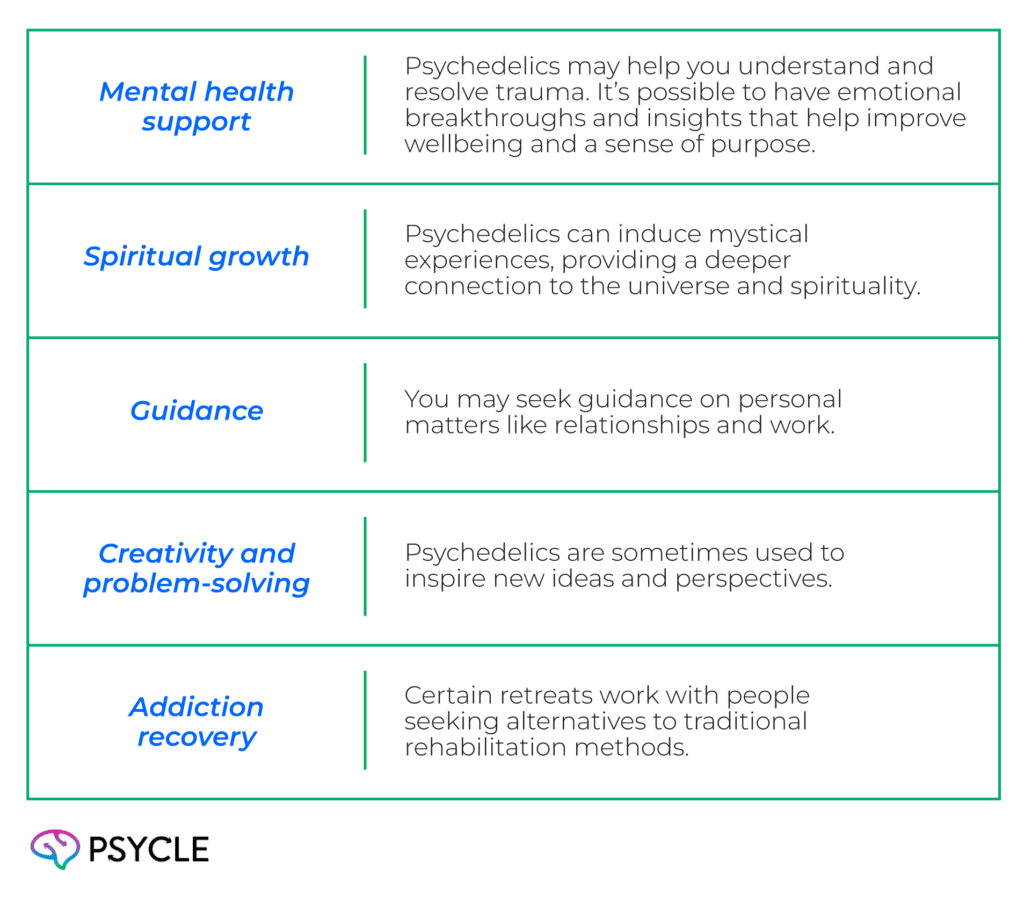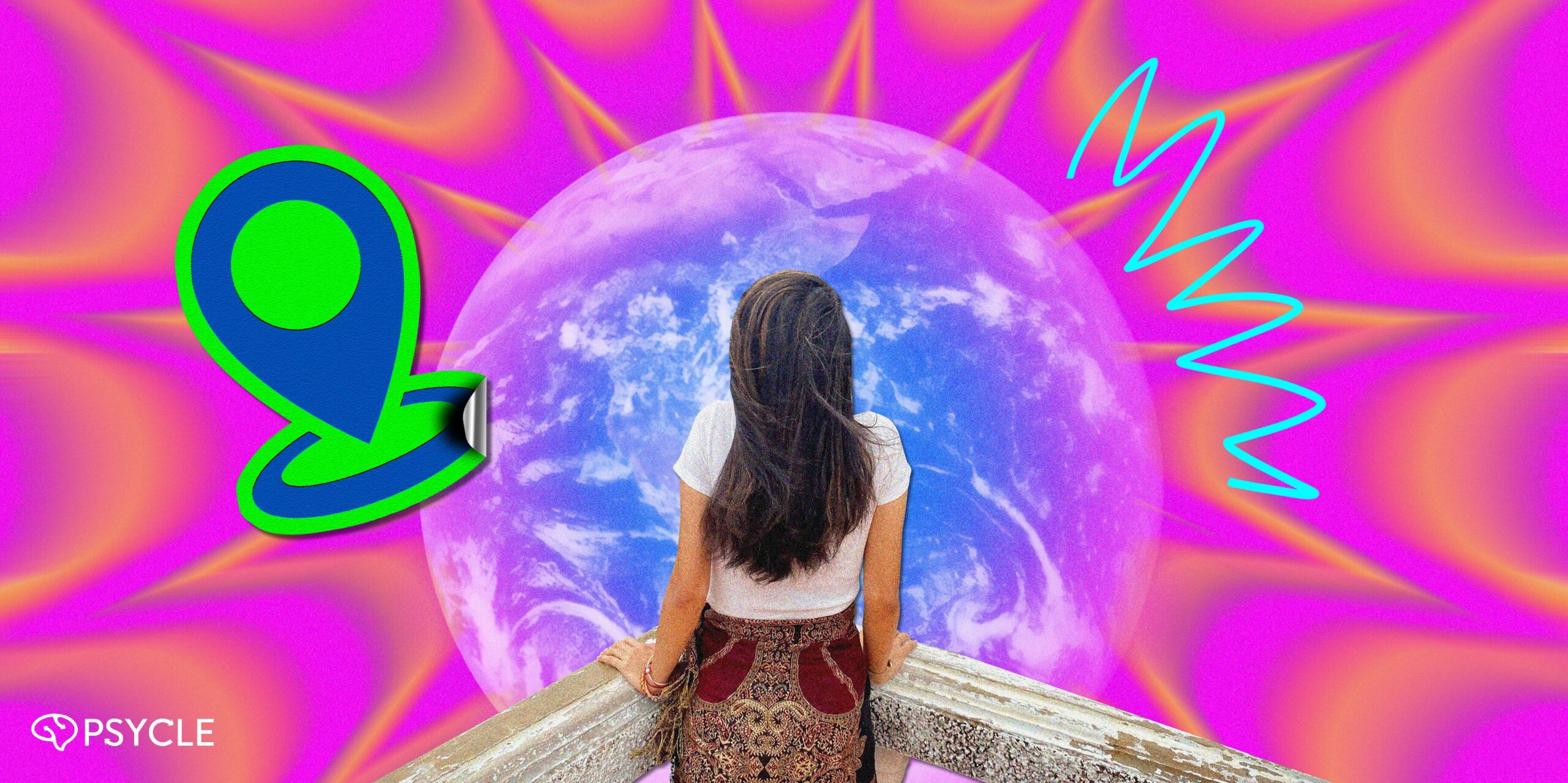Psychedelic retreats are becoming more popular than ever. People are travelling far and wide to explore the benefits of substances like magic mushrooms, ayahuasca, and ibogaine, in a multi-day experience.
However, while the number of retreat centres is increasing, psychedelics remain controlled substances across most areas of the globe. In this article, we’ll discuss the legality of psychedelic retreats in different countries and how to find one that is safe and right for you.
Key Takeaways
- Psychedelic retreats involve guided ceremonies with substances like ayahuasca, magic mushrooms, or ibogaine, often alongside wellness activities..
- Legal retreat hubs include Jamaica and the Bahamas (magic mushrooms), the Netherlands (magic truffles), Peru, Costa Rica and Brazil (ayahuasca), and Mexico (Indigenous traditions, ibogaine).
- Psychedelics are decriminalized in some destinations, like Costa Rica and places in Europe.
- Parts of the USA (Oregon, Colorado) allow retreats under special regulations.
- Many retreats draw on Indigenous or traditional practices, incorporating rituals, music, and additional plant medicines.
- Safe selection involves checking legality, staff qualifications, medical support, integration services, reviews, and participant screening.
What Are Psychedelic Retreats
A psychedelic retreat is an organized program where you take part in one or more guided psychedelic ceremonies. A ceremony usually involves taking a natural psychedelic substance, like ayahuasca or magic mushrooms, in a prepared setting with trained facilitators. Some retreats also use synthetic substances such as psilocybin (the active ingredient in magic mushrooms) or ibogaine.
There’s a rich history of psychedelic use among various cultures worldwide, and ceremonies often draw from these traditions. Ceremony guides may play traditional instruments and sing certain songs. They may offer traditional medicines along with the psychedelic substance, such as kambo or cacao.
Retreats can include one or multiple ceremonies using the same or a combination of different psychedelics. They often also include wellness activities to support mental and physical health, such as yoga, meditation, sound baths, nature walks, journaling, and group sharing circles.
Why People Attend Psychedelic Retreats
People attend retreats for many reasons:

Where Psychedelic Retreats Are Legal
Psychedelics are mostly illegal in much of the world, but some countries legally allow certain substances or their use under certain conditions. It’s within these areas that psychedelic retreat centres operate legally.
Some retreats are held in countries where psychedelics have been decriminalized. In these places, the substances are still technically illegal, but law enforcement rarely pursues charges, making the risk of prosecution low.
Magic Mushroom Retreats in the Caribbean
Jamaica and the Bahamas do not have laws banning magic mushrooms. Retreat centers operate openly, such as Beckley Retreats, offering both short and long programs.
Magic Truffle Retreats in the Netherlands
Truffles are part of the same organism as mushrooms, but instead of growing above ground like the fungi’s fruiting body—or mushroom—they develop underground. In the Netherlands, psilocybin-containing truffles are legal and are found in smart shops across Amsterdam. Centres like Alalaho Retreats have been openly running psychedelic retreats in the Netherlands for several years.
Ayahuasca Retreats in Peru
Ayahuasca is legal in Peru due to its long-standing role in cultural tradition. Groups native to the Amazon, such as the Shipibo, have used ayahuasca for healing and spiritual purposes for centuries. However, it’s only more recently that tourists have begun visiting Peru to partake in ceremonies themselves.
Retreat centers range from small family-run lodges to large, well-established operations with medical staff on-site, such as The Ayahuasca Foundation.
Psychedelic Retreats in Costa Rica
In recent years, Costa Rica has become a hub for psychedelic retreat centers. While most psychedelics remain illegal in Costa Rica, the country’s drug decriminalization laws mean that personal use typically results only in a fine rather than serious criminal charges.
Ayahuasca is legal in Costa Rica, however, and there are many centres running legal ayahuasca retreats such as Soltara Healing Centre.
Psychedelic Retreats in Mexico
Mexico allows certain psychedelics in Indigenous spiritual contexts. The country has a rich history of psychedelic use among various indigenous groups, and there are laws to protect these traditions. For instance, the Wixárika people of Nayarit use peyote in sacred rituals, and the Mazatec people of Northern Oaxaca work with psilocybin mushrooms for healing purposes.
In recent years, retreats involving Bufo–a psychedelic toad venom–have become more popular in Mexico. However, there’s no substantial evidence to support a traditional use of this medicine.
Mexico is also one of the only places where ibogaine is legal. Ibogaine is a compound isolated from the Iboga shrub bark, which has powerful anti-addictive properties. Retreats tend to focus on addiction recovery and are usually medically supervised.
Ayahuasca Retreats in Brazil
In Brazil, ayahuasca is legal for religious use. The Santa Daime and União do Vegetal churches are the most well-known groups that use it in structured ceremonies. Psilocybin mushrooms are not listed as illegal, but psilocybin itself is prohibited, creating an unclear legal situation.
Psychedelic Retreats in the USA
In the United States, psychedelics are classified as Schedule I substances. However, members of the Native American Church can use peyote in religious ceremonies. These gatherings take place mainly in the Southwest and Plains states.
Oregon is one of the few states where psilocybin has been legalized under certain conditions. The state has licensed psilocybin retreats, where trained facilitators guide sessions in approved facilities, such as Confluence Retreats. Colorado has also legalized natural psychedelic therapy, but retreats are still in the setup phase.
How to Safely Choose a Psychedelic Retreat
When considering a psychedelic retreat, legal safety should be a top priority. This not only protects you from legal trouble but also helps you avoid the anxiety about legality that could interfere with your experience.
Beyond legality, there are several other important factors to weigh. Psychedelic medicines can be deeply transformative, but they can also be very challenging. It’s essential to choose a retreat where you’ll be well-supported, with staff who are highly trained and experienced in guiding people through these experiences. There should also be medically trained staff on site.
You should also check that the retreat offers follow-up therapeutic support. Having guidance after the retreat is crucial for integrating and making sense of what you’ve experienced as you transition back into everyday life.
Before booking a retreat, make sure you do lots of research. Look into the retreat’s background, staff qualifications, and safety record. You should also check for reviews from past participants, using a third-party webpage, such as TripAdvisor or Reddit.
You should also speak directly with facilitators before booking. You can ask about what integration is available and get a sense of their character. The staff should also provide a thorough screening to ensure you’re psychologically and physically safe to participate in ceremonies.
FAQs
How Do I Know if a Psychedelic Retreat Center is Legal?
Check the laws of the country and ask the retreat to explain their legal basis. Look for evidence such as operating permits, cultural exemptions, or government acknowledgment.
Sources
- https://psychedelicalpha.com/data/worldwide-psychedelic-laws

